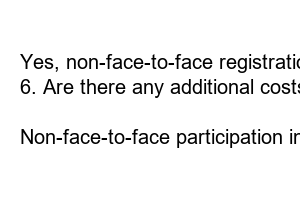주민등록 사실조사 비대면 참여
Title: Exploring the Convenience of Non-Face-to-Face Participation in Resident Registration Fact-Finding
Introduction:
In today’s fast-paced digital era, traditional methods of resident registration fact-finding are evolving to better meet the needs of the ever-growing population. Gone are the days when individuals had to go through time-consuming, face-to-face processes for registering their residential details. This blog post delves into the remarkable convenience and efficiency offered by non-face-to-face participation in resident registration fact-finding.
1. The Rise of Non-Face-to-Face Registration:
With advancements in technology and the increasing popularity of online platforms, non-face-to-face participation in resident registration fact-finding has become widely adopted. Citizens can now register their residency information via secure online platforms, bypassing the need for physical visits to government offices.
2. Streamlined Processes for Greater Efficiency:
By eliminating the need for face-to-face interactions, non-face-to-face participation in fact-finding expedites the entire registration process. Users can conveniently fill out digital forms, submit necessary documents electronically, and complete the registration within a few clicks – saving valuable time and effort.
3. Enhanced Accessibility and Convenience:
One of the greatest advantages of non-face-to-face registration is its accessibility. Individuals can register their residential details at any time, from anywhere, using their preferred devices. This flexibility allows people to avoid long queues, unexpected delays, and office closures, ensuring a hassle-free experience.
4. Ensuring Privacy and Data Security:
With built-in security measures and encrypted platforms, non-face-to-face registration ensures the privacy and protection of personal information. Users can provide relevant details confidently, knowing that their data is being handled securely and with the utmost care.
5. Overcoming Geographical Barrier:
Non-face-to-face participation in resident registration fact-finding is especially beneficial for those residing in remote or rural areas. By eliminating the need for physical presence, individuals in such regions can conveniently register their residency details without the burden of long journeys.
6. Increased Accuracy and Reduced Errors:
Digital fact-finding platforms often come with error prevention mechanisms that guide users through the correct completion of forms, reducing human errors. The automation and validation features minimize discrepancies, resulting in more accurate resident registration information.
FAQs:
1. Can I trust the security of non-face-to-face registration platforms?
Yes, non-face-to-face platforms employ robust security measures, including encryption and authentication protocols, to safeguard personal data.
2. Is non-face-to-face registration applicable to all individuals?
Yes, non-face-to-face registration is open to all citizens, regardless of their location or nationality.
3. What if I face technical difficulties during the process?
Most platforms provide user-friendly interfaces and offer technical support to assist users in case of any issues.
4. How long does the non-face-to-face registration process take?
The time required for registration varies depending on the platform, but it generally takes significantly less time compared to traditional face-to-face methods.
5. Can I update my registration details using non-face-to-face participation?
Yes, non-face-to-face registration platforms typically include provisions for updating and amending resident registration details.
6. Are there any additional costs associated with non-face-to-face registration?
Usually, non-face-to-face registration processes are either free or involve minimal charges to cover administrative costs.
Summary:
Non-face-to-face participation in resident registration fact-finding has revolutionized the way individuals register their residency details. This convenient, technologically advanced process assures faster, more accurate, and secure registration while overcoming geographical barriers. Embracing the benefits of non-face-to-face registration empowers citizens to streamline administrative requirements with ease and precision.

